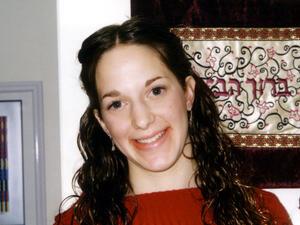Rebecca Chernin
Rebecca Chernin is an activist for anti-violence and domestic abuse survivors in the Orthodox Jewish community. Chernin was born in Arizona in 1984. In high school, she was in an abusive relationship, and with the help of REACH Beyond Domestic Violence, she ended the relationship and started working with the organization. Using her own experience in an abusive relationship in the Orthodox community, she has helped counsel numerous women in the community and bring general awareness to domestic violence issues in the community. Chernin was honored with the "Hero Among Us'' award from the Boston Celtics, the "Voice for Justice" award from REACH, and at the Jewish Women's Archive Women Who Dared event in 2004.
Rebecca was born in Arizona but moved to Sharon, Massachusetts, when she was three years old. She talks about her family life, childhood memories, and Jewish identity. Rebecca describes her advocacy work, trying to combat teen violence and support victims of domestic violence in the Jewish community, and how Jewish values are incorporated into her activism. Rebecca’s parents were role models for g'milut chasadim (acts of loving-kindness) and tzedakah, which inspired her activism. Chernin used her own experience as an Orthodox teen in an abusive relationship to counsel other survivors and raise awareness about domestic violence in the Jewish community. In her senior year of high school, Chernin explains that she ended her relationship with an abusive boyfriend with the help of REACH Beyond Domestic Violence and began working for the organization. Concerned that there was no specific involvement with the Jewish community, she began her own outreach effort, contacting synagogues and youth groups. Chernin spoke from her own experiences to counter denial and resistance about the presence of domestic violence in the Jewish community. Engaging with the oft-cited Jewish value of shalom bayit (peace in the home), Rebecca counseled survivors of abuse that their abusers were the ones who had broken the peace of the home and that returning to a violent situation was not the way to restore that peace. Finally, Chernin reflects on her advocacy work and goals for the future.



